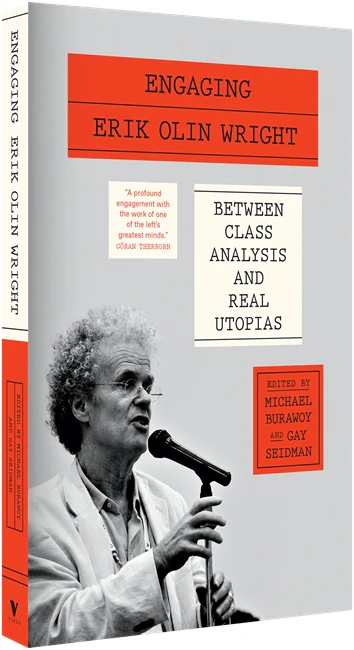It’s more than 5 years since Erik died which, for those who knew him, is quite hard to believe, as he is still a strong voice in many of our heads. Because I know many of our readers knew and admired him or his work (or both!) I thought I’d let you know that a couple of days ago Verso published a volume of essays focusing on his work, edited by Michael Burawoy and Gay Seidman. It contains essays by friends and students who’ve been influenced by him and his work over the years, and the essays engage with, as the subtitle suggests, work done over the whole span of his career. The contributors are: Michael Burawoy, Gay Seidman, Greta Krippner, Kwang-Yeong Shin, Joao Peschanski, Marta Soler-Gallart, Jacob Carlson and Gianpaola Baiocchi, Ruy Braga, Rina Agarwala, Rodolfo Elbert, Peter Ramand, Stephanie Luce and me (I trailed an earlier version of my occasionally rude (by my standards) essay here).
The kindle edition is remarkably well-priced!
{ 1 comment }
Brad DeLong (in a recent post summarising a joint podcast with Noah Smith) walks back his previous suggestion that it was time for neoliberals, among whom he had numbered himself, to pass the baton to “the Left”.
The political basis for this is that 20 or so Senate Republicans have been willing to pass legislation from time to time, rather than shutting down the government altogether. I don’t find this compelling, but I also don’t want to debate the issue.
Rather, I’m interested in the following remark, which crystallized a bunch of thoughts I’ve been having for some time
”How has the left been doing with its baton? Not well at all, for anyone who defines “THE LEFT” to consist of former Bernie staffers who regard Elizabeth Warren as a neoliberal sellout.”
This is a classic, indeed brazen, motte-and-bailey[1], in which the hard-to-defend bailey “the Left of the Democratic party (of which Elizabeth Warren is a prominent member) is doing badly” is replaced by the motte “THE LEFT (as represented, in this case, by disgruntled former Bernie staffers) is doing badly”.
{ 150 comments }
Something that’s bothered me for a while is the relationship between politics and friendship. Not just close friendship but also people who you are happy to hang out with socially. Some topics – I’d include Brexit, trans rights and Israel/Palestine – are especially divisive in that people who disagree on these seem to find it very hard to tolerate one another. (The woke/anti-woke split is also a marker, though it is tempting just to push back against whoever is being the most irritating and dogmatic in some given context.) Anyway, in those oppositions the other side is, you think, marked by some combination of stupidity and moral perfidy, such that it is impossible to retain the minimal degree of respect that friendship requires.
Except, except, there’s always someone whose personal charm or the fact that something other that politics is the basis for friendship means that they get forgiven or excused even when they say something that’s really off. And who is available makes a difference too: if you are in a small community or a workplace or a family then you may not have to rub along with the people you disagree with, but it is better if you do because you’re inevitably going to be seeing a lot of them.
Here’s something that’s particularly insidious: you don’t know if you disagree with some person, but you suspect, on the basis of some fact about them (religion, ethnicity, age, nationality, etc.) that you might. Though they are someone that seems nice, you don’t have such a deep friendship with them that means a rift would painful. You don’t want to ask them directly, it would be rude, and there seems to be something discriminatory about doing so: “Because you have characteristic X, I suspect you might believe something, and I need to know…” Why ask them if you aren’t going to ask everyone the same question, after all? So you don’t, but you don’t really want to risk discovering that they are, as you think of it, a bigot: that could lead to a painful argument or just mutual embarrassment. So you prefer to avoid, not to engage, and you drift apart through this shunning, which might be mutual: perhaps they also suspect that you are the kind of person who holds the belief of which they disapprove. But you never really know, you just suspect a possibility, an opportunity is lost, and the object of your shunning may be left with the thought that you are no longer having to do with them because of their age, ethnicity, etc. And in a certain sense, they wouldn’t be wrong.
{ 49 comments }
Here’s a metaphor. There’s an elderly person you’ve known for years. Not a close relative, no, but someone whose career you’ve followed. You feel tremendous respect for them, maybe some affection. They’re getting old and frail, but they’ve kept active. Now and then you might see an article or something, and you’ll think, huh: still with us.
And then something terrible happens, and they’re incapacitated, helpless, unable to speak anything but gibberish. Death seems imminent.
So the family rolls the dice on high risk, experimental brain surgery. And to everyone’s surprise, it works!
Mostly works. Your friend is still very frail, and they’ve definitely lost a step. The inevitable end has only been delayed.
But — they can speak, slowly but clearly. They can take care of themselves and carry out basic functions. They’re alive. You can talk to them. They’re even still able to work! At least, a little. So you maybe haven’t seen the last article. It’s an unexpected, surprise reprieve: you have them for a bit longer, another year or two or three.
That’s what it feels like.
{ 9 comments }
I believe that no-one deserves to be a billionaire. In the public realm, defenders of wealth concentration often come up with an example of a person who has created all their wealth themselves – the selfmade billionaire. They didn’t get their money from inheritance or some other form of luck, but from entrepreneurial instincts and efforts. At least, that’s how the argument goes.
The Dutch political philosopher Huub Brouwer and I hold that no-one deserves to be a billionaire (as I am sure many of you do too). And we were thinking that one way to make our (abstract, theoretical) arguments accessible to “Joe the plummer”, is to take an individual case of a selfmade billionaire, and delve into the details of their life story, and then apply the general arguments against the (lack of) deservingness of extreme wealth concentration to such a case study.
The question now is: who would make for the best casestudy – someone very rich (a billionaire or close by) who is perceived to be genuinely selfmade. Names that are often mentioned are JK Rowling, Bill Gates, Oprah Winfrey, and, more recently, Taylor Swift. Yet we’re probably running around in small circles, always mentioning the same (famous and visible) people.
Who do you think is the most selfmade billionaire?
{ 137 comments }
After a couple days to think on it, I think this post is right on. I just stumbled on a paper that stumbles, badly, over one of my two obvious thoughts about originalism. So let me point that out. [click to continue…]
{ 15 comments }
Looks like I haven’t posted for a couple years. Probably time to fix that!
This one kicks off from a tweet I fired off, off-handedly, that led somewhere useful. “If you were wanting a paradigm case-in-point to illustrate the plausibility of legal realism, the history of legal originalism would be hard to improve on.” [click to continue…]
{ 49 comments }
This text is not about Baby Reindeer, Netflix’s latest hit. It’s about one of the most perverse dimensions of sanism and anti-madness: the exploitation of madness as an edifying aesthetic resource. It is also about the obsolescence of narratives centered on the uncritical perspective of the traditional agent of the banality of evil, the mediocre white guy who destroys everything, including himself (even if temporarily), in the pursuit of a vague and elusive future for which he has neither the preparation nor the talent.
{ 6 comments }
Later this month it will be World Biodiversity Day, and we will again celebrate the remarkable contributions that biodiversity makes to the resilience and productivity of the earth’s ecosystems. But it will also be a fitting time to face the continued failure of our institutions to grasp the scale of biodiversity loss. Or, if not to grasp it, to respond in any way adequately.
The figures speak for themselves. Since 1992, the Convention on Biological Diversity has been charged with agreeing global targets for biodiversity conservation. The Aichi Biodiversity Targets for 2011-2020, for instance, aimed to halve the rate of habitat loss, protect 17% of terrestrial ecosystems, and much else besides.
None of those targets were met. In response, the Kunming-Montreal Agreement recently agreed to protect 30% of ecosystems by 2030, to restore 30% of degraded ecosystems, and so on and so on and so on. On current projections, these targets are going to be missed too, by some distance. Like Canute ordering the tides to stop, it turns out that setting targets, by itself, achieves nothing. [click to continue…]
{ 12 comments }
A transcript from memory of an evening conversation with my two older sons:
“I heard that Jeff Bezos could run through the streets every day, throwing hundred dollar bills in the air, and he’d still be making money.”
“I wonder if that’s true?” [click to continue…]
{ 27 comments }





